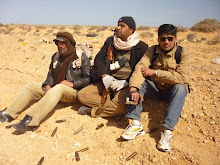India can certainly do well without tourists like Shah Mehmood Qureshi, Pakistan's Foreign Minister with a penchant for theatrics. After his extremely undiplomatic remarks during S.M. Krishna's Pakistan visit, Qureshi shot his mouth off again.
"I will undertake a visit to India only if I am assured that the neighbouring country (India) has the intention to hold a meaningful and result-oriented dialogue, otherwise I am not really fond of taking a tourist trip," he was quoted as saying.
Pakistan's biggest export remains terror and India certainly enjoys the most-favoured-nation status here. India can undoubtedly do better without tourists like Qureshi and terrorists like Ajmal Amir Kasab.
Let us examine Qureshi's statement closely. How can India assure Pakistan that there can be meaningful and result-oriented dialogue when Pakistan refuses to take a single step to dismantle the terror infrastructure aimed at India and prosecute the 26/11 masterminds?
New revelations prove the active involvement of Pakistani state actors. Pakistan has seen American terrorist David Coleman Headley's interrogation report. He has spoken about the direct involvement of Pakistan Navy personnel in training the 10 terrorists sent to Mumbai.
Worse, it now emerges that Lt Gen Ahmed Shuja Pasha, director general of the ISI, not only paid Rs 25 lakh to buy the boat (Al Husseini) for the 10 terrorists but also personally visited Zaki-ur-Rehman Lakvi and Sajjid Mir in jail. Any country with a powerful democratic set-up would have ordered a probe and taken the rogue general to task. But not Pakistan, where the army clearly calls the shots and orders puppets like Yousuf Raza Gilani and Qureshi to parrot the lines handed over to them.
Terror from Pakistan rightly is and should remain India's focus. Islamabad, without dismantling the terror infrastructure aimed at India and without going after the 'real' masterminds of 26/11, hopes to resume the composite dialogue. There is clearly no middle ground. So why go through the façade of talks?
I am not against talks. But talks for the sake of talks when the Pakistani establishment continues to plot attacks on India and Indian interests in Afghanistan do not make sense. After the sellout at Sharm-el-Sheikh, India agreed to talk to Pakistan when Gilani told Prime Minister Manmohan Singh in Thimpu that he had clearance from the army to resume talks. And then, the disaster in Islamabad with Qureshi calling India's foreign minister Krishna names.
This is clearly a part of Pakistan's blow hot-blow cold tactics. Pakistan is doing what it does best. Complicate the situation so much and create so many power centres that everybody has rights and nobody has any responsibilities. The civilian establishment can blame the army and the army can blame the civilian establishment. In the end there is the ISI and the 'fundoos' (fundamentalists) to blame for any fiasco.
India has to take care that it does not fall into Pakistan's trap anymore. Civil or military establishment remains immaterial. Power is wielded by the army. Any lasting peace and prevention of future terror attacks can only be ensured if the Pakistan Army is aboard the peace bandwagon. And that clearly will not happen till they change the syllabus at Pakistan military academy.
Till then, talk if you must. But do not lower your guard. Expect Pakistan to hit you when and where you least expect it. When that happens, instead of frothing in the mouth, hit back hard and fast.
Wargame your response now. If you have reasonable proof that elements of the Pakistani establishment were involved, punish them. That's the only way to ensure that the next terror attack is at least delayed if not prevented completely. Offence is not just the best but the only defence when you are living next door to terror.
Tuesday, July 20, 2010
Subscribe to:
Posts (Atom)


